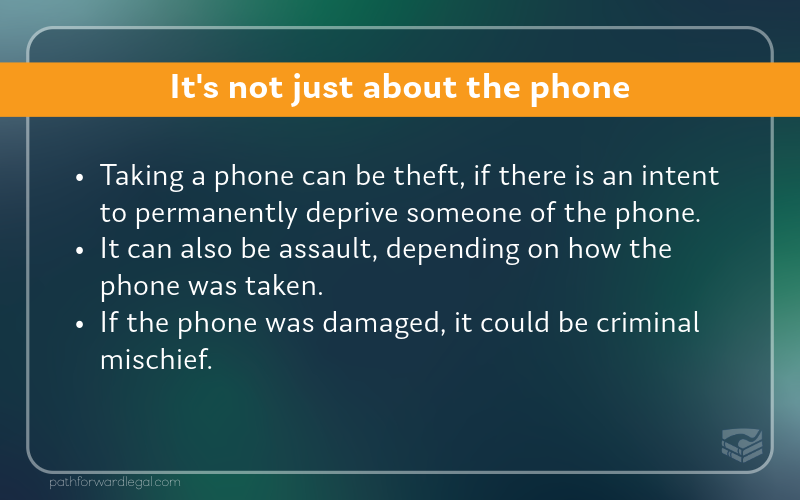Have you ever thought about whether taking someone’s phone could be seen as domestic violence in Colorado? It’s a nuanced question with a complex answer. Let’s unpack this and understand what Colorado law says about such scenarios.
When Taking a Phone Crosses the Line
Theft: A Taking is a Crime
Picture this: you take someone else’s cell phone without asking. That’s theft, plain and simple. This occurs when a person knowingly takes a phone without the owner’s permission, intending to deprive them of it permanently.
Theft of a communication device like a cell phone is taken seriously, especially when it involves family members or partners.
Assault: It’s Not Just About the Phone
Now, if you were forceful or threatening when you took the phone, that could lead to an assault charge. It’s about the use of force or the threat of it, and it’s particularly serious if the person ends up hurt or scared. In domestic violence situations, this can escalate quickly from a minor offense to a more serious charge, depending on the level of force used and the harm inflicted.
Criminal Mischief: Damaging Phones and More
What if the phone gets damaged in the process? That’s where criminal mischief comes in. It’s all about intentionally damaging property – in this case, a phone. You can even be charged with criminal mischief for damaging a phone that you paid for. If the phone is jointly owned, it’s still considered someone else’s property.

The Intersection with Domestic Violence
In Colorado, domestic violence isn’t a standalone charge but an enhancer to other offenses like theft, assault, or criminal mischief. It’s about causing harm or fear to someone you’re in a close relationship with.
Technically, domestic violence is defined as an act or threatened act of violence upon a person with whom the actor is or has been involved in an intimate relationship. It also includes any crime against a person or property when used as a method of coercion, control, punishment, intimidation, or revenge directed against such a person.
The Crucial Question: Why Was the Phone Taken?
The key here is the intent behind taking the phone. If it was to control, intimidate, or punish someone in an intimate relationship, it could be seen as domestic violence. This includes actions against a current spouse, a former spouse, a co-parent, or a partner.
The Legal Consequences
Facing charges enhanced by domestic violence can lead to serious outcomes. Even the domestic violence allegation has serious consequences. It can lead to increased penalties, mandatory arrest policies, and mandatory protection orders.
If convicted, you might be looking at jail time, fines, and mandatory domestic violence treatment programs. First offenses are taken seriously, and repeated offenses have strict penalties.
Understanding Domestic Violence in Colorado
We at Path Forward Legal have in-depth information about Domestic Violence charges, but here’s a brief overview relevant to our hypothetical of taking a phone.
It’s Not Just Physical Violence
Domestic violence in Colorado covers a range of behaviors. It’s not just about hitting or threatening someone. It can also be about controlling or intimidating actions, like taking away a partner’s phone to prevent communication.
Relationships Matter
Colorado law considers various types of relationships under domestic violence laws. This includes married couples, exes, people with a child together, and even unmarried couples. It doesn’t matter if you’re broken up or aren’t sleeping together: it can still be domestic violence.
Emergency Situations and Communication
Imagine a scenario where someone can’t call for help because their phone was taken. This can be considered a severe form of domestic violence, as it leaves the victim isolated and vulnerable. This could lead the district attorney to be more strict when they consider the case and their preferred outcome.
Additional Considerations in Domestic Violence Cases
The Impact on the Victim
Taking someone’s phone in a domestic violence context can be deeply harmful. It isolates the victim, instills fear, and cuts them off from outside support and emergency services. Judges may look at this when imposing bail or setting the conditions of the mandatory protection order in the case, even though you haven’t been convicted of anything.
Evidence is Crucial
In these cases, evidence is key. The police report, witness statements, and the context of the incident all play a critical role. The victim’s account and the accused’s intent are central to understanding the nature of the charge. It also may matter how the phone was taken, whose phone it really was, and if the “victim” had other ways of communicating with others.
Seeking Legal Advice
If you’re involved in such a situation, getting advice from a knowledgeable attorney is crucial. They can help you navigate the complexities of the law and advise you on the best course of action.
Don’t try to handle the case yourself, even if the “victim” wants to drop the charges. You might end up destroying possible defenses and making your case worse.
Wrapping It Up
So, can taking someone’s phone be domestic violence in Colorado? It certainly can, depending on the intent, the nature of the relationship, and the circumstances of the act. Every case is unique, and the details matter significantly. If you find yourself in such a situation, consulting with a lawyer is a wise decision. They can provide clarity on your position and guide you through the legal process. Remember, understanding the nuances of domestic violence laws, especially in actions like taking someone’s phone, is key to navigating these challenging situations.



